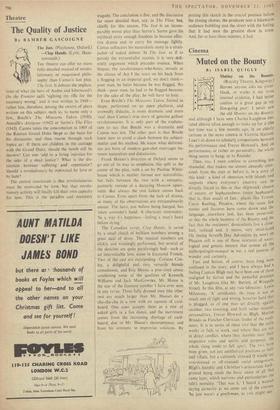Theatre
The Quality of Justice
By BAMBER GASCOIGNE Fe"The Just. (Playhouse, Oxford.) —Clap Hands. (Lyric, Ham- mersmith.)
THE theatre can offer no more fully detailed manual of revolu- lutionary or nzaquisard philo- sophy than Camus's last play, The Just. It debates the implica- tions of what the hero of Auden and Isherwood's On the Frontier calls 'sighting my rifle for the necessary wrong,' and it was written in 1949— rather late, therefore, among the swarm of plays written on this subject. such as, to name only a few, Brecht's The Measures Taken (1930), Anouilh's Antigone (1942) or Sartre's The Flies (1943). Camus takes the assassination in 1905 of the Russian Grand Duke Serge as the basis for his discussion, and then roams through such topics as: If there arc children in the carriage with the Grand Duke. should the bomb still be thrown? Can one 'add to a living injustice for the sake of a dead justice'? What is the dis- tinction between suffering and repentance? Should a revolutionary be motivated by love or by hate?
The central conclusion is that revolutionaries must be motivated by love, but that revolu- tionary activity will finally kill their own capacity for love. This is the paradox and necessary
tragedy. The conclusion is fine, and the discussion far more detailed than, say, in The Flies; but, chiefly for this reason, The Just is an incom-
parably worse play than Sartre's. Sartre gave his mythical story enough freedom to become effec- tive drama and to carry his message lightly. Camus suffocates his naturalistic story in a strait-
jacket of naked debate. In The Just, as if to
parody the existentialist maxim, it is very defi- nitely argument which precedes essence. When Stepan, the revolutionary-who-hates, reveals at
the climax of Act 1 the scars on his back from a flogging in an imperial gaol, we don't think—
poor man, he hates because he was flogged. We think---poor man, he had to be flogged because, for the sake of the play, he will have to hate.
Even Brecht's The Met-mires Taken, formal in shape, performed on an open platform, and avowedly didactic, is more dramatic and more 'real' than Camus's true story of genuine gallant revolutionaries. It is only part of the explana- tion to say that Brecht was a dramatist and Camus was not. The other part is that Brecht knew how to avoid a clash between his subject- matter and his method. He knew what deformi ties are born of modern gun-shot marriages be- tween naturalism and didacticism.
Frank Hauser's direction at Oxford seems to go out of its way to emphasise this split at the centre of the play. with a set by Pauline White- house which is neither formal nor naturalistic, but falls between the two with a romantic, painterly version of a decaying Moscow apart- ment. But always the real failure comes back to Camus. Even apart from the lack of drama, so many of his observations are extraordinarily unreal. The hero, just before being hanged, has taken someone's hand. A character comments: 'In a way it's happiness —feeling a man's hand before dying.'
The Canadian revue, Clap Hands, is saved by a small clutch of brilliant numbers among a great deal of dross. The musical numbers are slickly and winningly performed, but several of the sketches are quite paralysingly bad—such as an interminable love scene in fractured French. Two of the cast are outstanding--Coritine Con- ley, a delightful and very versatile blonde comedienne, and Eric House, a pint-sized comic combining some of the qualities of Kenneth Williams and Jack MacGowran. Mr. House is the star of the funniest number I have ever seen in any revue. Three fully dressed men (the other two are much larger than Mr. House) do a cha-cha-cha in a row with six squares of card- board. One soon accepts them as a row of naked girls in a fan dance, and the merriment comes from the increasing shortage of card- board, due to Mr. House's incompetence, and from his attempts to improvise solutions. By putting this sketch in the crucial position before the closing chorus, the producer sent a lukewarm audience bubbling into the street with the feeling that it had seen the greatest show in town. And, for at least three minutes, it had.










































































 Previous page
Previous page